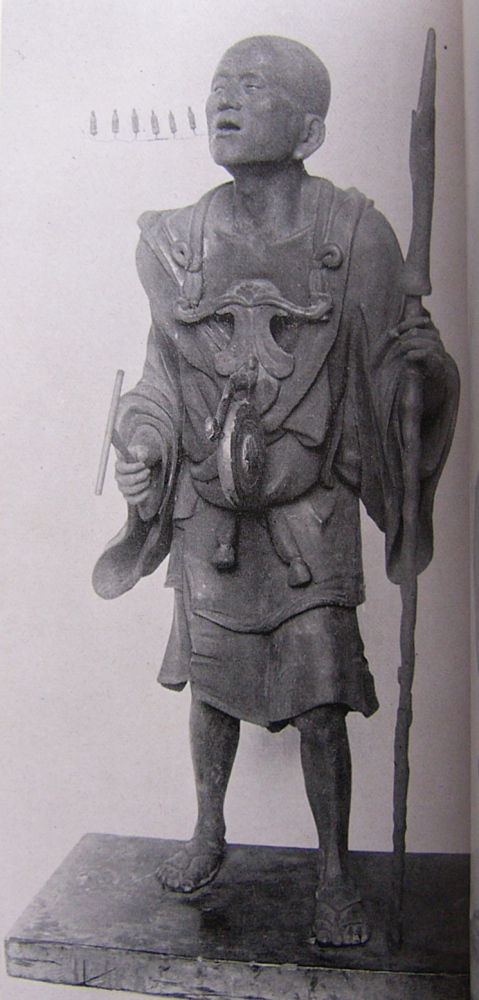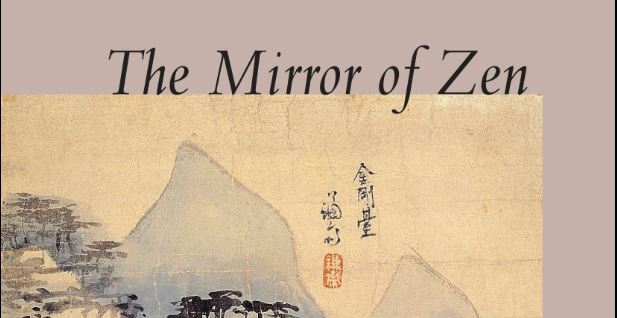From “Mirror of Zen” (禪家龜鑑, literally: “Turtle Mirror of the Zen Family”) by Sosan Taesa (西山大師), translated by Boep Joeng Sunim and Hyon Gak Sunim
https://www.shambhala.com/the-mirror-of-zen-1047.html
52
Merely chanting with the lips is nothing more than
recitation of the Buddha’s name. Chanting with a
one-pointed mind is true chanting. Just mouthing the
words without mindfulness, absorbed in habitual
thinking, will do no real good for your practice.Commentary
The six-worded dharma practice of chanting “NAMU AMITA BUL” can be
a shortcut road for cutting through the cycle of transmigration. But
when you chant this, you must remain focused one-pointedly on the
realm of the Buddha, reciting the Buddha’s name clearly and without
clinging to any passing thoughts. When your mindfulness accords
with the sound produced by your lips, completely cutting off all
thinking, this can truly be called “chanting.”Capping Word
The Fifth Patriarch once said, “It is better to keep your true, original
mind than to contemplate the Buddhas of the ten directions.” The
Sixth Patriarch said, “If you only contemplate other Buddhas, you will
never break free from life and death. You should keep your buddhamind
as it is in order to arrive on the other shore.” And he taught
further, “Buddha originates in your own nature. There is no need to
seek outside yourself.” He also said, “Ignorant people chant in the
hope of being born in the Pure Land, or Land of Utmost Bliss, but
true practitioners only focus instead on clearing their own mind.”
Also, “The Buddha does not save sentient beings. Rather, sentient
beings save themselves the instant they awaken to their true mind.”
These eminent teachers pointed directly to our original mind, without
depending on skillful means: there is no other teaching than this.And yet, however direct and effective such teaching may be, we
must also be able to say that paradise and Amita Buddha with his
forty-eight vows really do exist. Therefore it is taught that one who
recites Amita Buddha’s name even ten times will attain rebirth in a
lotus flower, thus escaping the cycle of birth and death. This teaching
has been given by all the Buddhas in the three divisions of time;5 all
bodhisattvas of the ten directions vow to attain such a rebirth, too.
The stories of those who have been reborn this way—either in the
past or in the present—have been faithfully handed down to us. So it
is hoped that no practitioners hold to mistaken views, and simply practice hard.Amita is a Sanskrit word meaning “infinite life” and “infinite light,”
and is used as a name for the Buddha of the ten directions and the
three divisions of time. As a younger practitioner, he was called
Venerable Dharmakara (“Store of the Dharma”). Making the fortyeight
vows before Lokesvararaja Buddha, he proclaimed, “When I
attain to buddhahood, should any of the numberless devas or
humans residing in the ten directions—even down to the tiniest
insects—chant my name but ten times, I will cause their rebirth in my
heavenly realm. I hereby vow never to enter fully into Nirvana until
this vow is accomplished.”Ancient sages in other times pronounced similar practices: “The
sound of chanting even a single word weakens even demonic forces,
and erases one’s name from the lists of the dead in Hell. Instead,
one is reborn as a lotus flower in a pond of purest gold.” The
Repentance Dharma teachings expand on this, saying, “We can use
our own innate power for spiritual practice, and we can use the spiritual
power of others. Progress through reliance on the former is
slower, while the latter is fast. Imagine two men who wish to cross a
vast sea: One man plants trees, raises them through hard work, cuts
them down when they are grown, and makes a boat. Then he
attempts his journey. This is what it is like to rely solely on your own
power. But another man simply borrows someone else’s boat and
crosses the sea directly. Anyone can see that this is a faster method.
It can be likened to relying on the power of the Buddha in our
spiritual practice.”This sutra also says, “A child who is threatened with fire or rising
waters cries out desperately, and his parents rush to save him. In the
same way, when a man chants the name of the Buddha, even in the
hour of his death, the Buddha will greet him with mysterious powers.
The Buddha’s great love and great compassion are greater even
than the love of a parent for their child, because sentient beings’
torment in the ocean of life and death is even more excruciating than
anything inflicted by fires or floods.”Of course, there are people who may hear teachings like this and
say, “Nonsense! Your own mind is already the Pure Land. There is
no such thing as being reborn in some such place!” Or “This is lowclass
teaching! Your own true nature is Amita Buddha, not different.
There is not some ‘other’ Amita Buddha who meets you!”Such words might have some truth to them, but they are not the
whole view. The reality of our condition is different from just those
views. Amita Buddha is perfect, having neither desire nor anger. But
are we free from desire or anger? The Buddha is known to be able to
change a raging hell into a world of lotus flowers just as effortlessly
as you might turn your hand over. And yet do we who live in hourly
fear of tumbling headlong into hell due to the unstoppable
momentum of our karma ever change this hell into lotus flowers?
The Buddha perceives infinite billions of galaxies as your or my eye
might perceive an object right in front of our nose. And yet we cannot
see the things that are happening outside the thin walls of this very
room, much less perceive the infinite billions of galaxies in every
direction!In the same way, though at the most fundamental level our nature
is the very nature of Amita Buddha, our actions are those of sentient
beings. The former and the latter, the ideal and the reality, are as far
apart as heaven and earth. Master Kuei-feng was clearly aware of
this when he said, “Even one who attains sudden enlightenment in
the end must do continuous, gradual practice.” How right he is!
Now let us turn again to the one who claims that he is already the
same as Amita Buddha and ask him, How is it that Shakyamuni
Buddha was manifested at the urging of this universe? And how is it
that an Amita Buddha could appear as such a spontaneous
manifestation?You can only truly understand if you reflect deeply within yourself.
When you find yourself suddenly being pulled through death’s door,
and there is no recourse back, are you unshakably confident that
you can find the freedom taught by the Buddhas even in that
moment? If not, then you should fully examine your foolish pride to
see whether it would not be better for you to discard that right now,
lest it trick you into the hellish torments of a lower rebirth!Great Patriarchs of the dharma though they were, even such as
Asvaghosha and Nagarjuna must have felt this, for they always
emphasized the crucial importance of striving toward a good rebirth
in our next life. Then who are we to disregard so easily the matter of
our next rebirth? The Buddha himself declared the importance of our
diligently striving: “The Pure Land of the Western Paradise is far, far
from here. You must pass 100,000 lands, and even 8,000 more
regions, in order to reach it.” Thus he freely employed words about
space and distance to give an almost visual sense, for the sake of
leading those of dull perceptions, to prod them on. But in other
places he said with equal sincerity, “The Pure Land of the Western
Paradise is not a faraway place. Why? Because the very mind of
sentient beings is the place of Amita Buddha.” This teaching reveals
his free use of expedient means for leading those of quicker
faculties.So we can see from all of this that the teachings can freely use
seemingly different expedient means and expressions to point to the
same universal substance. Only the words themselves have a
different appearance and meaning, yet the point they communicate
is the same. For one whose insight is in accord with his actions, it is
possible to see through what is said to be “near” or “far.” This is why
our tradition can embrace both ways of practice: calling out to Amita
Buddha, like Hui-yuan, and looking directly into true nature, like
Jui-yen.53
When you hear sutras being chanted—either by your
own voice or by other people—you are cultivating
affinity for the teachings and practice. It is a Way that
leads to a joyful mind and great spiritual merit. This
body is no more stable than a bubble: it will soon
disappear. But any efforts made for the sake of truth
will never die.Commentary
These words point to truly wise study: It is like one who ingests a
priceless diamond; this is something greater than just receiving and
holding the seven other most precious gems. Zen Master Yungming said,
“Even if you hear the Dharma teachings, though you may
not necessarily have complete faith in their meaning, nevertheless a
seed has been planted that will eventually result in your becoming a
buddha. And then even if you study these teachings yet still fail to
attain their true meaning, you have nevertheless made enough merit
that you cannot fail to be reborn as a human or deva (heavenly
spirit).”54
When studying Buddhist sutras, if you do not reflect
deeply on your own mind at the same time, you could
study the entire 84,000-volume canon of the
Buddha’s words and still it would not do you any
good whatsoever.Commentary
The previous chapter described the inner nature of wise study of the
sutras; this teaching tells how one may do the same study unwisely.
Just mouthing or reading words without interior reflection on mind
makes your actions no different from those of a bird chirping on a
spring day, or an insect buzzing through an autumn night. Kuei-feng
taught, “Just reading the sutras and chasing after the literal meaning
of the words themselves, from its very origin, is study that cannot
lead you to an awakening. Interpreting texts and analyzing the
meaning of words merely produces heaps of desire, anger, and
ignorant, mistaken views.”

